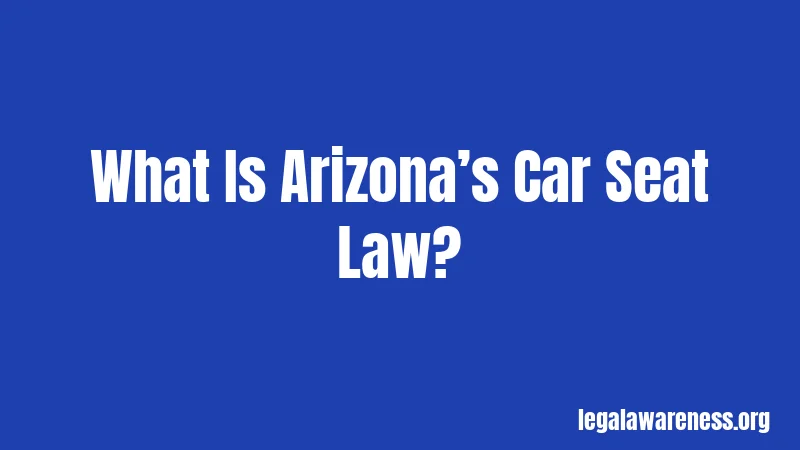Car Seat Laws in Arizona (2026): Keep Your Kids Safe and Legal
Most parents don’t realize how strict Arizona car seat laws actually are. Seriously. You could get ticketed just for having your kid in the wrong seat. Let’s break down exactly what you need to know to keep your children safe and avoid fines.
Car accidents are one of the top causes of preventable deaths for children in Arizona. Over 30% of kids who died in car crashes weren’t properly buckled in. That’s a scary number. The good news? Using the right car seat can reduce injury risk by up to 82%.
What Is Arizona’s Car Seat Law?

Arizona Revised Statute 28-907 covers all the car seat requirements. The law got updated back in 2012. It raised the age requirement from 5 to 8 years old for graduating to regular seat belts.
The law focuses on two things: your child’s age and height. Weight matters for safety, but Arizona law doesn’t actually mention it. Height is a better indicator of how well a seat belt fits.
Basic Age and Height Requirements
Children Under 5 Years Old
All kids under 5 must ride in a proper child restraint system. No exceptions (well, a few, but we’ll get to those). This can be a rear-facing seat, forward-facing seat, or booster seat that meets federal safety standards.
Pretty straightforward, right?
Children Ages 5 to 8
Kids between 5 and 8 need a child restraint system if they’re shorter than 4 feet 9 inches. Once they hit that height, they can use a regular seat belt. Even if they’re only 6 years old.
Sound complicated? It’s actually not. Just remember: under 8 AND under 4’9″ means they need a car seat or booster.
Children 8 and Older
Once your child turns 8, they’re legally allowed to use just a seat belt. Even if they’re shorter than 4 feet 9 inches. That said, keeping them in a booster until the seat belt fits properly is way safer.
Types of Car Seats

Not sure what counts as a proper restraint system? Let me break it down.
Rear-Facing Car Seats
These are for babies and toddlers. The seat faces the back of the car. It protects their head, neck, and spine during a crash.
Experts recommend keeping kids rear-facing until at least age 2. Some seats can hold kids rear-facing until they’re 40 pounds or more. The longer you keep them rear-facing, the safer they are.
Forward-Facing Car Seats
Kids graduate to forward-facing seats after they outgrow their rear-facing seat. These have harnesses that strap your child into the seat. They’re held in place with your car’s seat belts.
Most kids use forward-facing seats from about age 2 until they’re 4 or 5. But check your seat’s weight and height limits. Every seat is different.
Booster Seats
Booster seats lift your child up so the regular seat belt fits correctly. The lap belt should sit across their upper thighs, not their stomach. The shoulder belt should cross their chest, not their neck.
Kids typically need boosters from age 5 until they’re tall enough for seat belts to fit right. That’s usually around 4 feet 9 inches.
How to Know If the Seat Belt Fits
Wondering if your child is ready to ditch the booster? Here’s a simple test.
Have your child sit against the vehicle seat back. Their knees should bend naturally at the edge of the seat. The lap belt should lie across their upper thighs. The shoulder belt should cross the middle of their chest and shoulder.
If any of these don’t line up, they still need a booster. Trust me, this works.
Where Should Kids Sit?

Hold on, this part is important. Arizona law doesn’t require kids to sit in the back seat. But safety experts strongly recommend it.
Kids under 13 are safest in the back seat. Period. The back middle seat is the safest spot in most crashes. Front airbags can seriously hurt young children.
Okay, pause. Read that last part carefully. Front airbags are designed for adults. They can injure or even kill small children.
Penalties for Violating Car Seat Laws
Let’s talk about what happens if you break these rules. The fine is $50 for violating Arizona’s car seat law. That’s per violation.
Honestly, this is the part most people miss. You can avoid paying the fine if you show proof you bought a proper car seat after getting the ticket. Just bring your receipt to court.
But wait, it gets more serious. If a child gets injured in a crash because they weren’t properly restrained, you could face criminal charges for reckless endangerment. The penalties get way worse.
Special Circumstances and Exceptions
Not every situation requires a car seat. Arizona law includes some exceptions.
Emergency Medical Care
If you’re rushing a child to get emergency medical care, the car seat requirement doesn’t apply. Makes sense, right?
Certain Vehicle Types
Car seats aren’t required in:
- RVs and recreational vehicles
- Ambulances
- Commercial vehicles with commercial driver license holders
- Vehicles originally manufactured without seat belts
- Buses and school vans
Too Many Kids for Available Seats
Here’s an interesting one. If you have more kids under 8 than you have seat belts, you don’t have to seat all of them in car seats. At least one child must be properly restrained. Then you secure as many others as the space allows.
This usually only happens in vehicles with really limited passenger areas. It’s not a free pass to skip car seats if you have a normal car.
New Federal Safety Standards
Starting June 30, 2025, all new car seats made in the U.S. must pass tougher side-impact tests. This is a big deal for safety.
Don’t worry, you don’t need to replace your current seat. Older car seats are still legal unless they’re expired, damaged, or recalled. Check your seat’s manufacturing date on the label.
You can search for recalls at the NHTSA recall website. Seriously, do this. Recalled seats can be dangerous.
How to Install Your Car Seat Correctly
Most car seats aren’t installed correctly. That’s not your fault. They can be tricky.
Read your car seat manual completely. Also read your vehicle’s owner manual. Both have important info about installation.
The seat should be tight. You shouldn’t be able to move it more than one inch side to side or front to back when you pull at the base.
Need Help?
Many police and fire stations offer free car seat inspections. They’ll check your installation and show you how to fix any problems. You can also call the Child Safety Seat Hotline at 602-543-8687.
Some places even have certified inspection stations. These are usually staffed by specially trained technicians.
Free or Low-Cost Car Seat Programs
Can’t afford a car seat? Arizona has programs that can help. The Children are Priceless Passengers (C.A.P.P.) program offers loaner and rental programs.
Hospitals are required to give new parents information about these programs before discharge. You can also apply through responsible agencies like licensed hospitals or agencies serving homeless families.
If you’re approved as indigent (low-income), you can borrow a car seat for free as long as you need it. These seats come from the Child Restraint Fund, which is funded by fines and donations.
Seat Belt Laws for Older Kids and Adults
While we’re talking about car safety, let’s cover seat belt laws too. They’re related.
Kids Under 16
All passengers under 16 must wear seat belts. Even in the back seat. The driver is responsible for making sure they’re buckled up. The fine is $10 per person not wearing a seat belt.
Adults in Front Seats
All adults in front seats must wear seat belts. No exceptions unless you have a medical exemption.
Adults in Back Seats
Arizona doesn’t require adults over 16 in back seats to wear seat belts. That might seem weird, but it’s true. You should still wear one for your own safety.
Secondary Enforcement Rule
Arizona is a secondary enforcement state for seat belts. What does that mean?
A police officer can’t pull you over just for not wearing a seat belt. They need another reason first, like speeding or running a red light.
However, child car seat violations are different. An officer can stop you if they see a child who appears to be improperly restrained. Once stopped, they can’t search your vehicle unless there’s probable cause for another violation.
What Happens After You Get a Ticket
If you get cited for a car seat violation, you have options. You’ll get a ticket for $50.
You can pay the fine. Or you can buy a proper car seat and show your receipt to the court. Many judges will drop the fine if you prove you got a compliant seat.
The money from fines (minus court surcharges) goes into the Child Restraint Fund. This fund helps provide car seats to low-income families. So even the penalties help other kids stay safe.
Tips for Choosing the Right Car Seat
Shopping for car seats can be overwhelming. Here are some tips.
Check the weight and height limits on the seat’s label. Make sure it fits your child now and has room to grow. Look for seats that meet federal safety standard 49 CFR 571.213.
Don’t buy used seats unless you know their complete history. Seats that have been in crashes should be replaced. They can have hidden damage.
Check the expiration date. Most car seats expire 6-10 years after manufacturing. The plastic degrades over time and becomes less safe.
Common Mistakes Parents Make
You’re not alone if you’ve made these mistakes. Most people don’t realize how strict these rules are.
Moving to the Next Seat Too Soon
The biggest mistake is moving kids to the next seat type before they’re ready. Just because your 3-year-old fits in a forward-facing seat doesn’t mean they should be in one yet.
Keep them rear-facing as long as possible. Then keep them in a five-point harness as long as possible. Then keep them in a booster as long as possible. See the pattern?
Incorrect Installation
Having the right seat doesn’t help if it’s not installed correctly. Use the LATCH system or seat belt, never both together. Make sure the seat is tight and secure.
Loose Harness Straps
The harness should be snug. You shouldn’t be able to pinch any slack at the child’s shoulder. The chest clip should sit at armpit level.
Winter Coats in Car Seats
Bulky coats create slack in the harness. In a crash, the coat compresses and your child can slip out. Remove heavy coats before buckling them in.
How Car Seats Save Lives
Let me be real with you. Car seats work. The CDC found that proper car seat use reduces injury risk by up to 82% for infants. For toddlers, it’s about 54%.
Those are huge numbers. We’re talking about preventing serious injuries and deaths.
The laws exist because they save lives. It’s not about collecting fines. It’s about protecting the most vulnerable passengers on our roads.
What to Do After an Accident
If you’re in a crash, replace your car seat even if it looks fine. Most manufacturers recommend replacement after any crash. Insurance usually covers this.
Check if any children were injured. Even if they seem okay, get them checked by a doctor. Some injuries aren’t immediately obvious.
If another driver caused the crash and your child was injured, you may have a legal claim. Properly restraining your child strengthens your case and often reduces injury severity.
Staying Current with the Law
Laws can change. Right now, Arizona’s requirements are pretty clear. Kids under 8 and under 4’9″ need restraints. Kids under 5 always need restraints regardless of height.
If you have questions about your specific situation, contact the Arizona Department of Transportation. They can provide current guidance.
You can also check resources like Safe Kids Worldwide and the National Highway Traffic Safety Administration. Both offer detailed guidance on choosing and using car seats.
Frequently Asked Questions
My child is 7 years old and 5 feet tall. Do they still need a booster seat?
No. If your child is taller than 4 feet 9 inches, they don’t legally need a booster seat, even under age 8.
My child just turned 8 but is only 4’7″. Do they need a booster?
No. Once a child turns 8, Arizona law doesn’t require a booster anymore. But it’s safer to keep using one until the seat belt fits properly.
Can I use a seat that’s been in a crash?
You shouldn’t. Most manufacturers recommend replacing car seats after any crash. Even minor accidents can cause hidden damage that makes the seat less safe.
Where can I get help installing my car seat?
Many police and fire stations offer free inspections. Call the Child Safety Seat Hotline at 602-543-8687 or visit a certified inspection station.
What if I can’t afford a car seat?
Arizona has programs that provide free or low-cost car seats to families who qualify. Contact a hospital, domestic violence shelter, or the Children are Priceless Passengers program.
Are car seats required in taxis or rideshares?
Yes. The same laws apply in taxis and rideshares like Uber and Lyft. You’re responsible for providing a car seat for your child.
What happens if I’m just driving across the parking lot?
The law applies on public highways and roads. Technically, parking lots are often considered private property. But why risk your child’s safety for a short trip?
My car only has lap belts in the back. What do I do?
Some car seats can be installed with lap belts only. Check your seat’s manual. If your vehicle doesn’t have the required seat belts, it may be exempt under certain circumstances.
Final Thoughts
Arizona’s car seat laws aren’t complicated once you understand the basics. Kids under 8 and under 4’9″ need proper restraints. Kids under 5 always need restraints.
The $50 fine is nothing compared to keeping your child safe. Plus, you can often get it waived by buying a proper seat. The real penalty comes if your child gets hurt because they weren’t properly secured.
Stay informed, follow the rules, and don’t rush to move your kids to the next seat too soon. When in doubt, keep them in the safest restraint system possible for as long as possible.
Your child’s safety is worth the extra effort.
